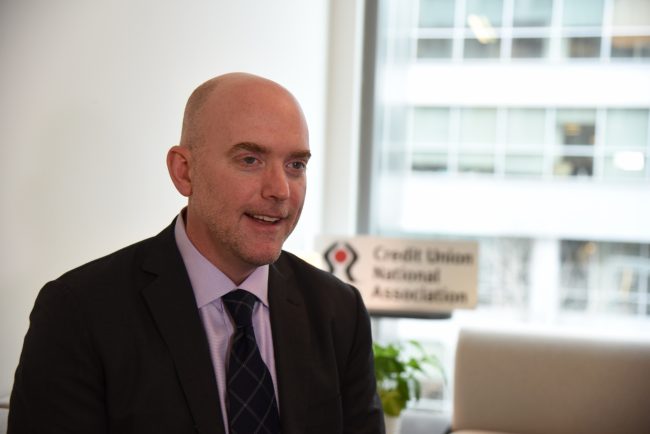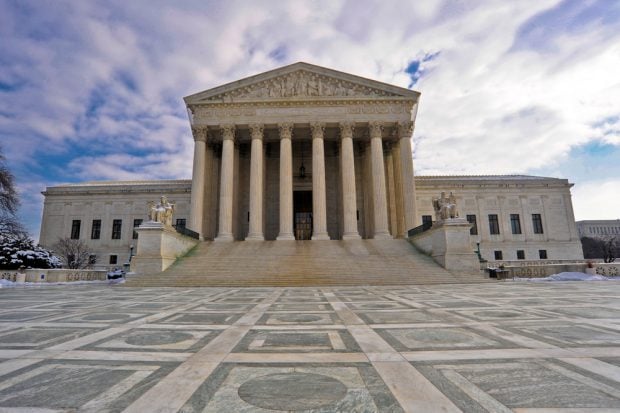 Ryan Donovan at workin a CUNA conference room in Washington, D.C. Source: JamarJemison/CUNA
Ryan Donovan at workin a CUNA conference room in Washington, D.C. Source: JamarJemison/CUNA
CUNA Chief Advocacy Officer Ryan Donovan has had politics on hismind since he was in middle school.
|Growing up in St. Louis, Donovan even kept a scrapbook ofnewspaper clippings about Congressman Dick Gephardt, who wasrunning for president in 1988. "I followed that campaign prettyclosely," he said. "I think that helped me get really into mysocial studies class; I remember being disappointed when I didn'thave a chance to discuss the Tiananmen Square protests with mysocial studies teacher, because they happened about a week afterour school year concluded."
|It's probably no surprise, then, that Donovan went on to majorin political science in college, earned a master's degree ingovernment, and worked for Dick Gephardt after college. Donovan wasalso a member of the congressional staff of Rep. Brad Sherman(D-Calif.) and director of federal government affairs at theCalifornia and Nevada Credit Union Leagues before joining CUNA asvice president of legislative affairs in 2007. He became CUNA'schief advocacy officer in January 2015.
|In this second installment of CU Times' new monthlyQ&A feature "Spending Time With …" Donovan talked aboutwhat it's like to lobby for a living, the industry's inroads ingovernment advocacy, raising kids and what he's got his eye onnext.
|CU Times: Some people areskeptical about lobbyists. Where do you think that skepticism comesfrom, and how do you respond to skeptics?
|Donovan: In terms of addressing the skepticism,I think it comes from a misunderstanding of what lobbying is andwhat it isn't. I think the profession is maligned because there's aperception that special interests are pulling the levers ofgovernment. But if you really step back and think about it, thetruth of the matter is that most people probably have a whole hostof personal and professional interests that are represented byadvocates in Washington or their state capital.I think if I talked to anybody on the street just for afew minutes, I could probably figure out a half dozen to a dozenlobbyists that are working here to try to make the interest thatthey care about a little bit better.
|CU Times: People in your lineof work have to be good at persuading people to do things. It's askill many people would like to have. What's your advice for makinga good argument in a short amount of time to someone you don't knowwell?
|Donovan: The best way to persuade somebody todo something you need them to do is convince them that it was theiridea. In order to do that, you really have to understand what keepsthem up at night and what gets them out of bed. So if you can keyin on what they're worried about, what they're passionate about,then you can begin to put together a case that they're going torespond to. This doesn't just work on politicians, it really isapplicable to all aspects of life.
|CU Times: What part of yourjob gives you the most trouble?
|Donovan: What gives me the most trouble isresisting the urge to dive into the day-to-day of the functionsthat I'm responsible for. So sometimes I think the best thing thatI can do is to try and get out of the way and let good people dogood work. Ultimately, my job is about working with our members,working with our leagues to develop the broader strategy to setthat strategic direction, and then helping the CUNA League teamexecute the plan. I will tell you that I really love writingletters. I love going to the Hill and meeting with folks, andsometimes I just can't resist that urge to get in there and dothat.
|CU Times: Since you've joinedCUNA, how do you think the credit union industry has progressed interms of government advocacy – and what still needs to bedone?
|Donovan: When I came to CUNA, the credit unionsystem was rightly recognized as a grassroots powerhouse. I'm notsure we had, at the time, a true north star in terms of what ouradvocacy efforts were all about. You know, our goal – while wenever articulated it this way – it felt like it was more aboutgetting a Rose Garden ceremony than really trying to affect thingsfor credit unions. I always would hear, 'We need a big win … " andwould sort of scratch my head and think, well, I think what wereally need to do is try to improve the operating environment forcredit unions. We were also really siloed in how we approachedthings here at CUNA. You take an issue like data security and, youknow, really prior to 2015 we had four different people working ondata security at CUNA reporting up for fourdifferent senior vice presidents, and they didn't talk to eachother, and their efforts weren't coordinated.
|What we've been able to do, particularly over the last fiveyears, is try to set a new course. First we established an advocacygoal, which is to revolutionize the operating environment forcredit unions through the removal of regulatory barriers and theexpansion of powers. The second thing we've done is kind of wildand crazy for a trade association to do: We listen to our membersas we put together our advocacy agenda, and we try to engage ourleague partners as well to develop and implement that agenda.
|The third thing is we really do work very hard on strengtheningthat connection with the leagues. The fourth thing that we've donehere is recommit ourselves to grassroots by developing andexecuting on the membership activation program, which is reallydesigned to get credit union members involved in our advocacy. Andthen the last thing we've done is realigned internally in order tobe successful.
|When I think about what more we could do, there are really twothings. The first is we need more credit union member engagement inour advocacy efforts. Second, we've got to make an effort to tellthe credit union story together better.
|CU Times: Everybody has jobstress. A lot of it's related to packed schedules. How do youmanage the stress of a busy schedule?
|Donovan: I'm really not just saying this, but Ihave the best executive assistant in the world. She keeps thingsfrom slipping through the cracks, and really I can't overstate theimportance of her to my work or the work that we do here. On apersonal level, I think there's two things that really help memanage the stress. First, over the last 10 years or so, personalfitness has become more and more important to me. I run; I enjoytaking spin classes – just doing something active every day keepsme feeling good and staying positive. I've got an Apple watch … Ihave a 390-day streak right now. I think I've missed two days on myactivity ring in the last three years. The other thing is I try notto sweat the small stuff and to suffer fools gladly.
|CU Times: You've got twodaughters, ages 13 and 9. How do you handle raising kids whileyou're climbing the ladder?
|Donovan: One of the things that really helps meis that my wife works for a consulting firm that servesassociations, and she's able to do her job from home. So she does alot of the daily work of getting the girls off to school, beingthere when they're home, and helping to shepherd them to theiractivities. But when I am with them, the thing that I really sortof key on is making sure that the time that we spend together isgreat quality. What's really been neat, especially over the lastcouple of years, is just watching them develop personalities and,at times, kind of even seeing myself in them.
|CU Times: What personal goalsare you looking forward to meeting this year?
|Donovan: My sister, who lives in Florida, beganto do some long-distance running. We actually ran a half marathontogether. We had a lot of fun doing it, and so we've talked aboutdoing a half marathon together in May in Maryland, near D.C., andthen maybe a full marathon in our hometown in Missouri in October.So I think I'm going to keep at that and I'm looking forward tosharing that with my younger sister.
Complete your profile to continue reading and get FREE access to CUTimes.com, part of your ALM digital membership.
Your access to unlimited CUTimes.com content isn’t changing.
Once you are an ALM digital member, you’ll receive:
- Critical CUTimes.com information including comprehensive product and service provider listings via the Marketplace Directory, CU Careers, resources from industry leaders, webcasts, and breaking news, analysis and more with our informative Newsletters.
- Exclusive discounts on ALM and CU Times events.
- Access to other award-winning ALM websites including Law.com and GlobeSt.com.
Already have an account? Sign In
© 2024 ALM Global, LLC, All Rights Reserved. Request academic re-use from www.copyright.com. All other uses, submit a request to [email protected]. For more information visit Asset & Logo Licensing.









